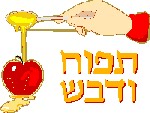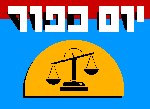
Rosh
Hashanah This is the new year and is
celebrates the birthday of the world, and more specifically the birthday
of the first 2 spiritual beings, Adam and Hava (Eve). According to the Jewish
 calender,
this will be the year 5759 since the end of creation. That is a lot
of candles! Of course, we don't actually
celebrate with candles on a cake. Instead, we have a large family
meal with apples, challah, and honey. Sometimes we also have honey
cake. We want the year to be sweet.
We also spend a great deal of time during the 2 days of Rosh Hashanah
in the synagogue, the Jewish house of worship, praying as a community.
Rosh Hashanah is also known as Yom HaDin or the Day of Judgement.
The shofar (rams horn) is blown, calling
us to repent and improve our behavior towards both G-d and fellow humans.
The whole month before Rosh Hashanah is spent in self evaluation and making
amends to anyone we wronged. Quite a difference
from the way the secular new year is celebrated,
is it not?
calender,
this will be the year 5759 since the end of creation. That is a lot
of candles! Of course, we don't actually
celebrate with candles on a cake. Instead, we have a large family
meal with apples, challah, and honey. Sometimes we also have honey
cake. We want the year to be sweet.
We also spend a great deal of time during the 2 days of Rosh Hashanah
in the synagogue, the Jewish house of worship, praying as a community.
Rosh Hashanah is also known as Yom HaDin or the Day of Judgement.
The shofar (rams horn) is blown, calling
us to repent and improve our behavior towards both G-d and fellow humans.
The whole month before Rosh Hashanah is spent in self evaluation and making
amends to anyone we wronged. Quite a difference
from the way the secular new year is celebrated,
is it not?
Yom
Kippur or the Day of Atonment, is when
the figurative book of life is closed. It comes 10 days after Rosh
 Hashanah.
G-d's judement of us for the past year is complete. We spend the
whole day from sundown to sundown (the Jewish day begins at sundown) fasting
and praying. We wear no animal skins, as it is deemed inappropriate
for the day. Some dress in all white. Again, the shofar is
blown. Though we fast, Yom Kippur is considered to be a day of joy,
the judgement for the year is complete, the book is sealed, and most of
all, we have a fresh start having apologized to and making amends for anything
we have done to another. This means if, for example, one said angry
words to someone an apology and fence mending has been done by the time
of Rosh Hashanah. And it is not just words that we must fix between
our fellow humans. If we did any wrong against another, it should
be fixed before Rosh Hashanah. On Yom Kippur, we atone for chet
(missing the mark) in our relationship with G-d...and of course, that
includes chet against our fellow humans. That we have
already dealt with chet with the person or people, does not mean
we do not have to repent of it and apologize to G-d for it too. When
Yom Kippur is over, we truely do have a clean slate, as we have repaired
that years wrong. In the comming year we must strive to not repeat
the same mistakes, to always become better.
Hashanah.
G-d's judement of us for the past year is complete. We spend the
whole day from sundown to sundown (the Jewish day begins at sundown) fasting
and praying. We wear no animal skins, as it is deemed inappropriate
for the day. Some dress in all white. Again, the shofar is
blown. Though we fast, Yom Kippur is considered to be a day of joy,
the judgement for the year is complete, the book is sealed, and most of
all, we have a fresh start having apologized to and making amends for anything
we have done to another. This means if, for example, one said angry
words to someone an apology and fence mending has been done by the time
of Rosh Hashanah. And it is not just words that we must fix between
our fellow humans. If we did any wrong against another, it should
be fixed before Rosh Hashanah. On Yom Kippur, we atone for chet
(missing the mark) in our relationship with G-d...and of course, that
includes chet against our fellow humans. That we have
already dealt with chet with the person or people, does not mean
we do not have to repent of it and apologize to G-d for it too. When
Yom Kippur is over, we truely do have a clean slate, as we have repaired
that years wrong. In the comming year we must strive to not repeat
the same mistakes, to always become better.
